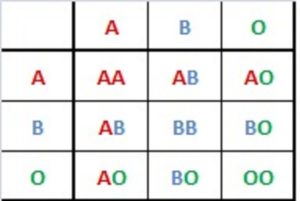93 White spotting: When there’s more than two alleles
So far, we have discussed genes which have only two alleles. However, that is not always the case: there can be more than two alleles for a given gene. One example is the MITF gene, which is the major gene that controls white spotting in dogs. This protein is required for the migration and survival of melanocytes into the skin during development. If it is not functional, it impairs the ability of the skin to make pigment, thus “covering up” the effect of other color genes. There are thought to be at least four alleles that can contribute (Karlsson, 2007). Depending on which alleles are present in a dog, the amount of white can vary from none (a solid-colored dog) to mostly white (Table 2 and Figure 24).
Table 2: Combinations of different alleles for MITF result in different amounts of white present in the coat.
| Alleles | Amount of white |
| SS | None (solid colored) |
| Ssi | Small amounts of white possible on chin, chest, feet, and tail tip |
| Ssp | Pied markings where the coat is more than 50% colored, with white on the face, chest, feet, collar, underbelly, and tail tip |
| sisp | Approximately even amounts of color and white |
| sise | More than 50% white with irregular splashes of color |
| sese | Mostly white with only minimal areas of color, perhaps on one or both ears, an eye patch, or a spot near the tail |

Human Connection – Blood Type
Human blood type was discussed in the previous section. You may remember that there are three alleles for the ABO gene: A, B, and O. A and B are codominant, meaning that if both alleles are present, both will be seen in the phenotype. A person with type AB blood has one A allele and one B allele.
O is recessive to A and B. A person with the genotype AO will have Type A blood. A person with the genotype BO will have type B blood. Type O blood results from two O alleles.

Photo credit: Kalaiarasy, from Wikipedia.
References
Unless otherwise noted, images on this page are licensed under CC-BY 4.0 by OpenStax.
Karlsson EK, Baranowska I, Wade CM, Salmon Hillbertz NH, Zody MC, Anderson N, Biagi TM, Patterson N, Pielberg GR, Kulbokas EJ 3rd, Comstock KE, Keller ET, Mesirov JP, von Euler H, Kämpe O, Hedhammar A, Lander ES, Andersson G, Andersson L, Lindblad-Toh K. 2007. Efficient mapping of mendelian traits in dogs through genome-wide association. Nat Genet. 39(11):1321-8.

